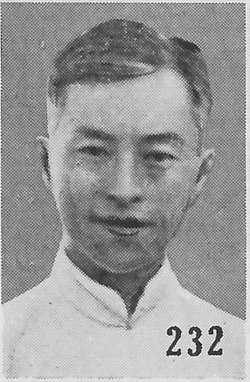Chen Lifu
You can help expand this article with text translated from the corresponding article in Chinese. (February 2025) Click [show] for important translation instructions.
|
Chen Lifu | |
|---|---|
陳立夫 | |
 Chen Lifu as pictured in The Most Recent Biographies of Chinese Dignitaries | |
| Minister of Education of the Republic of China | |
| In office January 1938 – December 1944 | |
| Preceded by | Wang Shijie |
| Succeeded by | Zhu Jiahua |
| Personal details | |
| Born | 21 August 1900 Wuxing, Zhejiang, Qing Dynasty (present-day Huzhou) |
| Died | 8 February 2001 (aged 100) Taichung City, Taiwan |
| Nationality | Republic of China |
| Political party | Kuomintang |
| Spouse | Sun Lu-ching |
| Children | 4 |
| Relatives | Chen Guofu (brother) Chen Tsu-li(half brother) |
| Education | Beiyang University (BS) University of Pittsburgh (MS) |
Chen Lifu or Ch'en Li-fu (simplified Chinese: 陈立夫; traditional Chinese: 陳立夫; pinyin: Chén lì-fū; 21 August 1900 – 8 February 2001) was a politician in the Republic of China. He was a close advisor of Chiang Kai-shek. With his brother Chen Guofu, he led the CC Clique.
Life and career
[edit]Chen was born in Wuxing, Zhejiang, China (modern Huzhou). In 1925, Chen formally joined Kuomintang (KMT) in San Francisco after receiving his master's degree in mining engineering from the University of Pittsburgh.[1] On January 9, 1926, Chiang Kai-shek hired Chen as his confidential secretary.[2] In 1927, Chiang appointed Chen to head the Investigation Section of the Organization Department of the KMT[3] Chen and elder brother Chen Guofu became heads of the Kuomintang's secret service, leading a political faction known as the CC Clique.[4]
In late 1935, China faced the looming threat of war with Japan, and Chiang decided to Chen to the Soviet Union to negotiate a treaty of mutual military assistance. However, although Chen flew to Berlin in disguise, prepared to go on to Moscow, preliminary negotiations broke down and he was recalled.[5] In the fall of 1936, Chen was Chiang's representative at a series of secret meetings with Chinese Communist Party representative Pan Hannian, where the two sides attempted to negotiate a united front against the Japanese.[6] This attempt failed, leading to the Xi'an Incident.
In 1938, Chen was again promoted, becoming the minister of education. Chen held this position until 1944.[7]
References
[edit]- ^ Ch'en 1994, pp. 16–18.
- ^ Ch'en 1994, p. 23.
- ^ Ch'en 1994, p. 65.
- ^ van de Ven 2003, p. 181.
- ^ Yang 2020, pp. 62–63.
- ^ Sheng 1992, p. 158.
- ^ Ch'en 1994, p. 147.
Bibliography
[edit]- Ch'en, Li-fu (1994). The storm clouds clear over China, the memoir of Ch'en Li-fu, 1900-1993. Stanford, California: Hoover Press.
- Sheng, Michael (1992). "Mao, Stalin, and the Formation of the Anti-Japanese United Front: 1935-1937". The China Quarterly (129): 149–170.
- van de Ven, Hans (2003). War and Nationalism. New York: Routledge.
- Yang, Kuisong (2020). "Sino-Soviet Diplomacy Under the Threat of War". In Shen, Zhihua (ed.). A Short History of Sino-Soviet Relations, 1917–1991. Translated by Xia, Yafeng. Singapore: Palmgrave Macmillan and Social Sciences Academic Press.
- 1900 births
- 2001 deaths
- Members of the Kuomintang
- Chinese anti-communists
- Chinese people of World War II
- Politicians from Huzhou
- Republic of China politicians from Zhejiang
- Taiwanese people from Zhejiang
- University of Pittsburgh alumni
- Chinese men centenarians
- Taiwanese men centenarians
- Members of the 1st Legislative Yuan
- Chinese politician stubs
